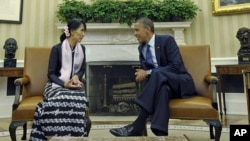WHITE HOUSE —
President Barack Obama and Burmese opposition leader Aung San Suu Kyi have met for the first time. The two Nobel Peace laureates spoke at the White House Wednesday as the United States lifted sanctions on Burma’s president and parliament speaker.
The closed-door meeting was part of the Burmese democracy leader’s first U.S. trip since the military government released her from 15 years of house arrest in 2010.
A White House statement issued after the meeting said President Obama expressed his admiration for Aung San Suu Kyi’s courage, determination and personal sacrifice in fighting for democracy and human rights.
Obama also welcomed the progress the democracy leader and Burma’s president have made by working together for reforms.
Meanwhile, the U.S. Wednesday lifted sanctions on Burma’s President Thein Sein and parliament speaker Thura Shwe Mann. Without comment, the Treasury Department removed both from its list of individuals and companies accused of links to terrorism, narcotics or other illegal activities.
Aung San Suu Kyi has recently called for U.S. sanctions on Burma to be lifted. In a VOA interview on Tuesday, she said the sanctions had helped to pressure the military to make reforms, but that it was now time for the Burmese people to stand on their own.
Burma has made political and economic reforms in the past two years, and the U.S. recently normalized relations with Burma. In July, U.S. officials allowed American companies to start investing there.
Earlier Wednesday, White House press secretary Jay Carney praised Aung San Suu Kyi for her struggle for democracy and reform “…a struggle that is resulting now in her visit and in the remarkable reforms that have been undertaken by President Thein Sein in Burma.”
Oval Office meetings with the president are usually reserved for visiting presidents or prime ministers. This meeting took place quietly, with no video cameras or reporters present.
Aung San Suu Kyi’s U.S. tour will overlap the visit of President Thein Sein to New York next week for a meeting of the United Nations General Assembly. Some experts believe the Obama administration is trying to prevent the democracy activist’s visit from overshadowing that of the Burmese president.
Carney Wednesday praised Burma’s leader for his role in instituting reforms. “We continue to work with President Thein Sein and the government there, as well as others, to help the cause of reform and to help the cause of the democratic process there,” Carney said.
Burma has released more than 100 political prisoners so far this month, and has freed thousands more over the past few years. Activists and rights groups, however, say hundreds more are still being held.
Aung San Suu Kyi’s initial White House visit followed a ceremony on Capitol Hill, in which she was presented the Congressional Gold Medal, the U.S. Congress’ highest honor.
In her 17 days in the United States, Aung San Suu Kyi will also visit the states of California, New York, Kentucky and Indiana, among others. The city of Fort Wayne, Indiana has one of the country’s largest Burmese-American communities.
The closed-door meeting was part of the Burmese democracy leader’s first U.S. trip since the military government released her from 15 years of house arrest in 2010.
A White House statement issued after the meeting said President Obama expressed his admiration for Aung San Suu Kyi’s courage, determination and personal sacrifice in fighting for democracy and human rights.
Obama also welcomed the progress the democracy leader and Burma’s president have made by working together for reforms.
Meanwhile, the U.S. Wednesday lifted sanctions on Burma’s President Thein Sein and parliament speaker Thura Shwe Mann. Without comment, the Treasury Department removed both from its list of individuals and companies accused of links to terrorism, narcotics or other illegal activities.
Aung San Suu Kyi has recently called for U.S. sanctions on Burma to be lifted. In a VOA interview on Tuesday, she said the sanctions had helped to pressure the military to make reforms, but that it was now time for the Burmese people to stand on their own.
Burma has made political and economic reforms in the past two years, and the U.S. recently normalized relations with Burma. In July, U.S. officials allowed American companies to start investing there.
Earlier Wednesday, White House press secretary Jay Carney praised Aung San Suu Kyi for her struggle for democracy and reform “…a struggle that is resulting now in her visit and in the remarkable reforms that have been undertaken by President Thein Sein in Burma.”
Oval Office meetings with the president are usually reserved for visiting presidents or prime ministers. This meeting took place quietly, with no video cameras or reporters present.
Aung San Suu Kyi’s U.S. tour will overlap the visit of President Thein Sein to New York next week for a meeting of the United Nations General Assembly. Some experts believe the Obama administration is trying to prevent the democracy activist’s visit from overshadowing that of the Burmese president.
Carney Wednesday praised Burma’s leader for his role in instituting reforms. “We continue to work with President Thein Sein and the government there, as well as others, to help the cause of reform and to help the cause of the democratic process there,” Carney said.
Burma has released more than 100 political prisoners so far this month, and has freed thousands more over the past few years. Activists and rights groups, however, say hundreds more are still being held.
Aung San Suu Kyi’s initial White House visit followed a ceremony on Capitol Hill, in which she was presented the Congressional Gold Medal, the U.S. Congress’ highest honor.
In her 17 days in the United States, Aung San Suu Kyi will also visit the states of California, New York, Kentucky and Indiana, among others. The city of Fort Wayne, Indiana has one of the country’s largest Burmese-American communities.




